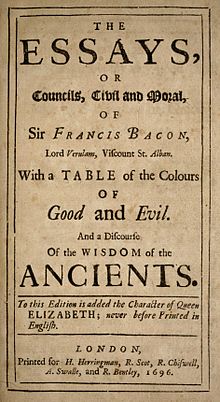
An essay is, generally, a piece of writing that gives the author's own argument, but the definition is vague, overlapping with those of a letter, a paper, an article, a pamphlet, and a short story. Essays have been sub-classified as formal and informal: formal essays are characterized by "serious purpose, dignity, logical organization, length," whereas the informal essay is characterized by "the personal element, humor, graceful style, rambling structure, unconventionality or novelty of theme," etc.

Francis Bacon, 1st Viscount St Alban PC, known as Lord Verulam between 1618 and 1621, was an English philosopher and statesman who served as Attorney General and Lord Chancellor of England under King James I. Bacon led the advancement of both natural philosophy and the scientific method, and his works remained influential even in the late stages of the Scientific Revolution.

Michel Eyquem, Seigneur de Montaigne, commonly known as Michel de Montaigne, was one of the most significant philosophers of the French Renaissance. He is known for popularizing the essay as a literary genre. His work is noted for its merging of casual anecdotes and autobiography with intellectual insight. Montaigne had a direct influence on numerous Western writers; his massive volume Essais contains some of the most influential essays ever written.

William Camden was an English antiquarian, historian, topographer, and herald, best known as author of Britannia, the first chorographical survey of the islands of Great Britain and Ireland, and the Annales, the first detailed historical account of the reign of Elizabeth I of England.

Joseph Hall was an English bishop, satirist and moralist. His contemporaries knew him as a devotional writer, and a high-profile controversialist of the early 1640s. In church politics, he tended in fact to a middle way.
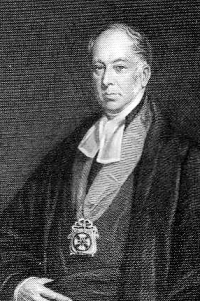
Richard Whately was an English academic, rhetorician, logician, philosopher, economist, and theologian who also served as a reforming Church of Ireland Archbishop of Dublin. He was a leading Broad Churchman, a prolific and combative author over a wide range of topics, a flamboyant character, and one of the first reviewers to recognise the talents of Jane Austen.
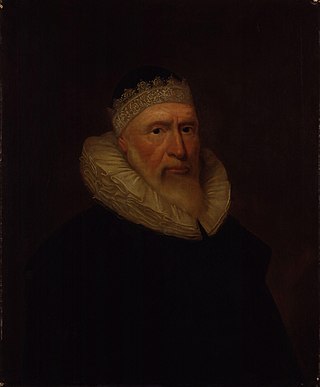
Sir Julius Caesar was an English lawyer, judge and politician who sat in the House of Commons at various times between 1589 and 1622. He was also known as Julius Adelmare.

John Gerard was an English herbalist with a large garden in Holborn, now part of London. His 1,484-page illustrated Herball, or Generall Historie of Plantes, first published in 1597, became a popular gardening and herbal book in English in the 17th century. Except for some added plants from his own garden and from North America, Gerard's Herbal is largely a plagiarised English translation of Rembert Dodoens's 1554 herbal, itself highly popular in Dutch, Latin, French and other English translations. Gerard's Herball drawings of plants and the printer's woodcuts are mainly derived from Continental European sources, but there is an original title page with a copperplate engraving by William Rogers. Two decades after Gerard's death, the book was corrected and expanded to about 1,700 pages.

The Jacobean era was the period in English and Scottish history that coincides with the reign of James VI of Scotland who also inherited the crown of England in 1603 as James I. The Jacobean era succeeds the Elizabethan era and precedes the Caroline era. The term "Jacobean" is often used for the distinctive styles of Jacobean architecture, visual arts, decorative arts, and literature which characterized that period.
Sir William Cornwallis was an early English essayist and served as a courtier and member of Parliament. His essays, influenced by the style of Montaigne, rather than that of Francis Bacon, became a model for later English essayists. He has sometimes been confused with his uncle of the same name.

Sir Christopher Yelverton was an English judge and Speaker of the House of Commons.
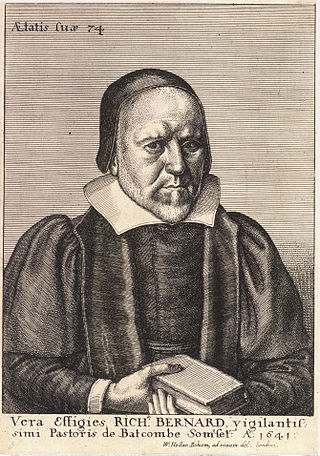
Richard Bernard (1568–1641) was an English Puritan clergyman and writer.
Sir Brian William Vickers is a British academic, now Emeritus Professor at ETH Zurich. He is known for his work on the history of rhetoric, Shakespeare, John Ford, and Francis Bacon. He joined the English department at University College London as a visiting professor in 2012.
Sir Nathaniel Bacon, of Stiffkey in Norfolk, was an English lawyer and Member of Parliament (MP).

In the Kingdom of England, the title of Secretary of State came into being near the end of the reign of Elizabeth I, the usual title before that having been King's Clerk, King's Secretary, or Principal Secretary.
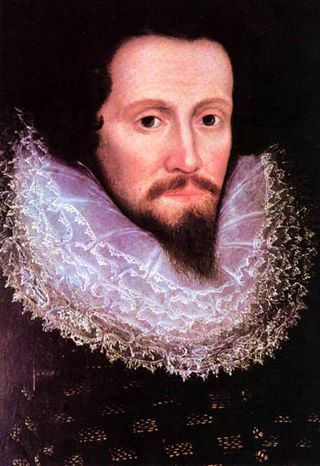
Anthony Bacon (1558–1601) was a member of the powerful English Bacon family and was a spy during the Elizabethan era. He was Francis Bacon's elder brother.
Henry Atkins (1558–1635) was an English physician.
Francis Bacon, 1st Viscount St Alban, KC was an English philosopher, statesman, scientist, lawyer, jurist, author, and pioneer of the scientific method. He served both as Attorney General and Lord Chancellor of England. Although his political career ended in disgrace, he remained extremely influential through his works, especially as philosophical advocate and practitioner of the scientific method during the scientific revolution.

This is a complete chronological bibliography of Francis Bacon. Many of Bacon's writings were only published after his death in 1626.

The following bibliography of Aldous Huxley provides a chronological list of the published works of English writer Aldous Huxley (1894–1963). It includes his fiction and non-fiction, both published during his lifetime and posthumously.
